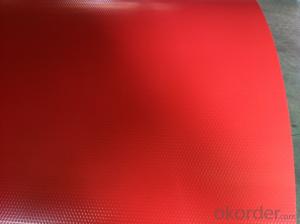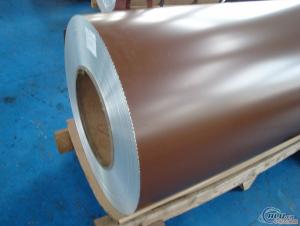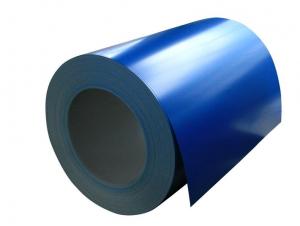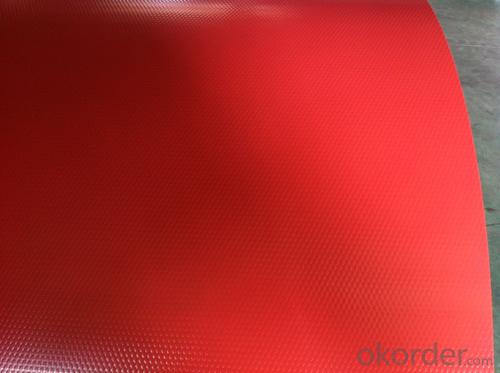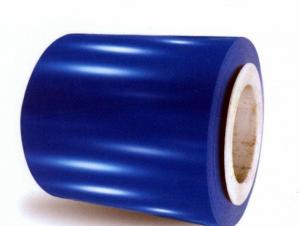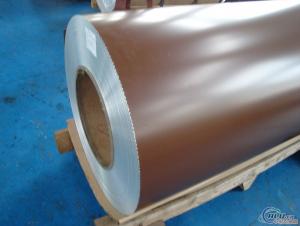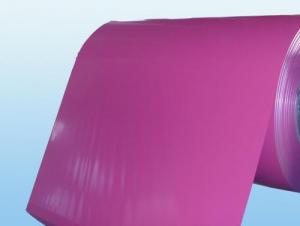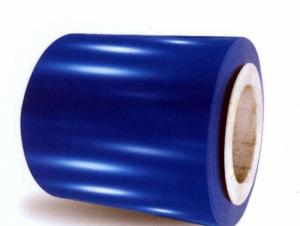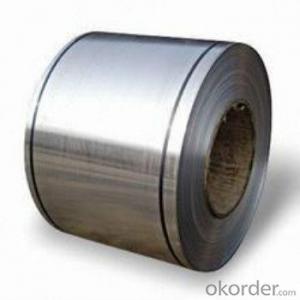Ruud Aluminum Coils Price - PE Coated Aluminium Coils RAL9010 AA3003 H14
- Loading Port:
- China main port
- Payment Terms:
- TT or LC
- Min Order Qty:
- 5 m.t.
- Supply Capability:
- 5000 m.t./month
OKorder Service Pledge
OKorder Financial Service
You Might Also Like
Structure of Product Description
PE Coated aluminium coils are widly used in decoration field. For the painting, it depends on the using evironment. If you use in the open air, we recommend the PVDF coated aluminium coils. This kind of painting can last 15-20 years. If you use in the room, we recommend PE coated aluminium coils. The price is much more competitive.
Main features of the product
a.Competitive price---We have our own mills and can produce mill finished aluminium coils, so we can control the production cost better.
b.Professional after-sale service---We have more than 15 years exportation experience and you need not worry about the exporation problems.
c.Fast delivery time---We can control the delivery time within 35 days.Image
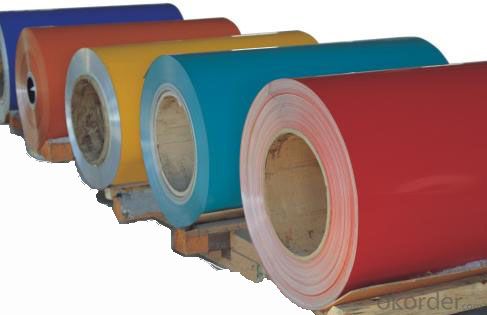
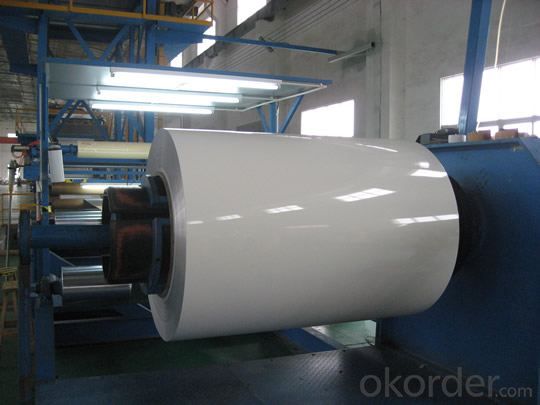
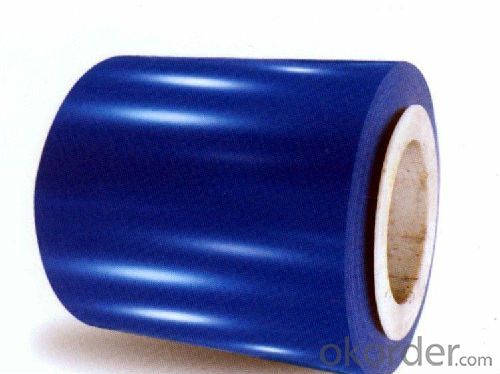
Product Specification
Alloy Temper Painting Coating Thickness Coil ID AA3003 H14 PE 22-25 MICORN 505MM
5. FAQ
What is the quality standard?
---Usually our standard is GB3880-2006
What is the largest width?
---It is 2300mm
What is the MOQ?
---Usually we can accept 80 tons.
| Polyester coated aluminum foil coil | |||||
| Item | Technical requirement | Item | Technical requirement | Color | Specification |
| Thickness of coating film | ≥16μm | Boiling water resistance | Make no difference within 2 hours | 0.10×1240-0.60×1240 | |
| Glossiness deviation | When glossiness< 70, the tolerance ≤10 When glossiness ≥70, the tolerance ≤ 5 | Color difference | △E≤3.0 | ||
| Pencil hardness | ≥HB | ||||
| Adhesive force | ≥ grade 1 | ||||
| Flexibility (T) | ≤3 | ||||
- Q: Why is the aluminum roll upset?
- Mainly in the aluminum slitting process, for various reasons, does not meet the standards and specifications of products, can be used to roll the machine from the new trimming and slitting, winding up to meet customer needs of product specifications
- Q: Can aluminum coils be used in the production of aluminum foam panels?
- Indeed, aluminum foam panels can be crafted using aluminum coils. Typically, molten aluminum is infused with a foaming agent, causing it to expand and generate a foam structure, which is subsequently solidified and refined into panels. Aluminum coils find extensive application across industries such as construction, automotive, and packaging owing to their remarkable attributes including lightweight nature, high strength, resistance to corrosion, and excellent thermal conductivity. These qualities render aluminum coils suitable for deployment in the creation of aluminum foam panels. To manufacture aluminum foam panels, the aluminum coil can be processed into a flat sheet or strip, subsequently sliced into the desired dimensions and configurations for the panels. The flat aluminum sheet or strip can be effortlessly managed and processed during the foam production process. The foaming agent can be introduced into the molten aluminum, with the expanding aluminum foam being poured onto the flat sheet or strip to shape the panels. By leveraging aluminum coils in the production of aluminum foam panels, efficient manufacturing processes can be achieved, as the coils can be conveniently rolled, molded, and trimmed to meet specific design prerequisites. Furthermore, the utilization of aluminum coils guarantees that the foam panels retain the desirable properties of aluminum, such as durability, strength, and lightweight nature. All in all, aluminum coils can be effectively employed in the production of aluminum foam panels, providing a versatile and cost-effective solution for an array of applications encompassing insulation, sound absorption, and structural components.
- Q: Can aluminum coils be used for food storage containers?
- Indeed, food storage containers can be made from aluminum coils. Aluminum is widely chosen as a material for such containers because of its numerous advantageous qualities. Notably, it is lightweight, sturdy, and possesses exceptional thermal conductivity, enabling it to distribute heat evenly for effective cooking or cooling purposes. Moreover, aluminum is non-toxic, devoid of odor, and resistant to corrosion, rendering it a secure option for food storage. Additionally, it acts as a proficient shield against light, moisture, and oxygen, thereby assisting in maintaining the freshness and quality of the stored food. All in all, opting for aluminum coils for food storage containers can be a dependable and practical decision.
- Q: How much does it cost to use fluorocarbon paint for aluminum coil roller coating?
- Fluorocarbon paint can be divided into fluorocarbon paint for exterior wall, aluminum fluorocarbon paint, metal fluorocarbon paint and steel structure fluorocarbon paint according to usages. It can also be divided into national standard product and non-national standard product according to industrial standards.
- Q: How are aluminum coils inspected for quality?
- To ensure the quality of aluminum coils, a series of rigorous tests and inspections are conducted. These inspections play a crucial role in meeting industry standards and specifications. Visual inspection is a commonly used method for examining aluminum coils. Trained inspectors carefully scrutinize the coils for visible defects like scratches, dents, or other physical imperfections that could impact the coil's quality. Specialized lighting and magnification equipment are used to achieve a thorough examination. Dimensional inspection is another important method. It involves measuring the dimensions of the coils and comparing them to specified tolerances. This ensures that the coils meet the required size and shape criteria. Coating inspection is also vital. It focuses on examining the aluminum coil's coating for uniformity, adhesion, and thickness. Specialized instruments are used to measure the coating thickness and ensure it meets the specified requirements. Furthermore, mechanical properties such as tensile strength, yield strength, and elongation are tested to evaluate the strength and durability of the aluminum coils. Samples from the coils are subjected to controlled stress, and their response is measured. Lastly, various non-destructive testing techniques are utilized to detect hidden defects or flaws that may not be visible to the naked eye. These techniques include ultrasonic testing, eddy current testing, and dye penetrant testing. They help identify internal defects like cracks or voids that could compromise the quality of the aluminum coils. In summary, a combination of visual inspections, dimensional measurements, coating inspections, mechanical property testing, and non-destructive testing techniques are employed to thoroughly inspect aluminum coils and ensure their suitability for use in industries like construction, automotive, and aerospace.
- Q: wood aluminium windows?
- Does this mean the vinyl or aluminum is laminated over the wood? I do not know of the aluminum over owod. Aluminum transfers heat and cold very well, so vinyl is much better. Vinyl does not oxidize and is a standard on windows today. There are viyl clad wood windows, for people who like real wood inside, but none of the maintenance headaces of real wood outside.
- Q: This question seeks advice on methods to prevent rust formation on aluminum coils.
- <p>To prevent rust on aluminum coil, ensure proper storage conditions by keeping the coils dry and avoiding contact with moisture. Use protective coatings or sealants that are compatible with aluminum to create a barrier against the elements. Regularly inspect the coils for signs of corrosion and clean them with a non-abrasive cleaner to remove any contaminants. Avoid using harsh chemicals that could accelerate oxidation. Maintain good ventilation in storage areas to reduce humidity, which can contribute to rust formation. Finally, consider using anodizing or other surface treatments that enhance the aluminum's natural resistance to corrosion.</p>
- Q: How are aluminum coils processed and fabricated?
- Aluminum coils are processed and fabricated through a series of steps to shape them into desired forms for various applications. The process typically involves the following steps: 1. Coil Manufacturing: Aluminum coils are initially manufactured by melting aluminum ingots and casting them into large, flat coils. These coils are then rolled through a series of rolling mills to achieve the desired thickness and shape. 2. Coil Cleaning: Once the coils are rolled, they undergo a cleaning process to remove any dirt, oil, or other impurities that may have accumulated during manufacturing. This is typically done using chemical cleaning agents or mechanical scrubbing techniques. 3. Coil Annealing: Annealing is a heat treatment process where the coils are heated to a specific temperature and then slowly cooled. This process helps to relieve internal stresses, improve the coil's mechanical properties, and enhance its formability. 4. Coil Slitting: In this step, the large coils are cut into narrower strips or sheets of desired widths. This is done using a slitting machine, which can cut multiple strips simultaneously. Slitting allows for better utilization of the material and ensures that the coils are in the required dimensions for further processing. 5. Coil Surface Treatment: Aluminum coils often undergo surface treatments to enhance their appearance, improve corrosion resistance, or provide additional protection. Common surface treatments include anodizing, painting, or applying a protective coating. 6. Coil Fabrication: Once the coils are cleaned, annealed, and treated, they can be further processed into various shapes and forms. Common fabrication techniques include stamping, bending, deep drawing, roll forming, welding, and machining. These processes allow the aluminum coils to be transformed into components such as sheets, plates, tubes, profiles, or intricate designs. 7. Quality Control: Throughout the entire processing and fabrication stages, strict quality control measures are implemented to ensure that the final products meet the required specifications and standards. This involves regular inspections, testing for mechanical properties, dimensional accuracy, surface quality, and other relevant parameters. Overall, the processing and fabrication of aluminum coils involve a combination of metallurgical, mechanical, and chemical processes to achieve the desired final product. These processes aim to enhance the properties of the aluminum, improve its formability, and create a wide range of products for various industries such as automotive, construction, aerospace, and packaging.
- Q: The heat of fusion of aluminum is 3.95kj/g. What is the molar heat of fusion of aluminum? What quantity of energy is needed to melt 10.0g of aluminum? What quantity of energy is required to melt 10.0 mol of aluminum? Three questions i need help with can someone show me step by step please so i can get it thank you a bunch
- Heat Of Fusion Of Aluminum
- Q: Is it possible to utilize aluminum coils for the purpose of storage?
- <p>Yes, aluminum coils can be used for storage, particularly in industrial settings. They are often used for storing materials such as paper, plastic films, and other coilable products. Aluminum coils are lightweight, corrosion-resistant, and can be easily transported and handled. They are also recyclable and environmentally friendly. However, their suitability for storage depends on the specific application and the type of material being stored. It's important to ensure that the coils are stored in a dry, clean environment to prevent damage and maintain their integrity.</p>
Send your message to us
Ruud Aluminum Coils Price - PE Coated Aluminium Coils RAL9010 AA3003 H14
- Loading Port:
- China main port
- Payment Terms:
- TT or LC
- Min Order Qty:
- 5 m.t.
- Supply Capability:
- 5000 m.t./month
OKorder Service Pledge
OKorder Financial Service
Similar products
Hot products
Hot Searches
Related keywords
